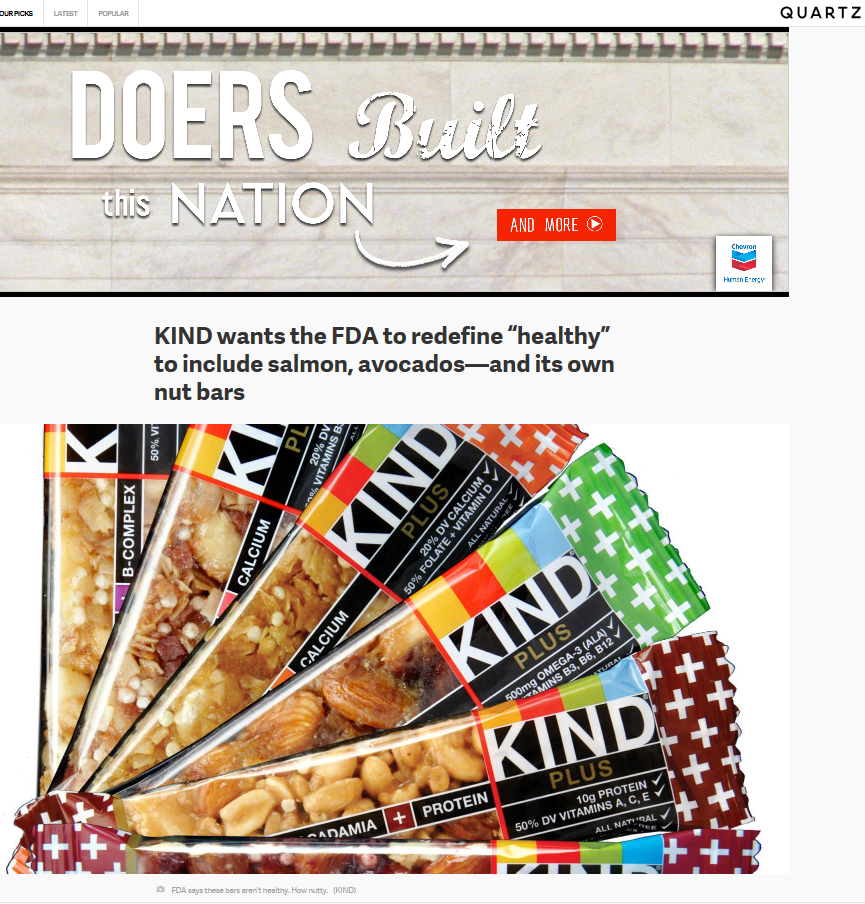KIND wants the FDA to redefine “healthy” to include salmon, avocados—and its own nut bars
Salmon and avocados have both been dubbed “superfoods”—but that doesn’t mean the US Food and Drug Administration would agree that they’re “healthy.” Because of their fat content, if the word “healthy” appeared on the packaging of those foods, the company that put it there might end up with one of the agency’s dreaded warning letters.
That’s why Kind LLC, the makers of nut-based bars, is filing a Citizens Petition with the FDA to change its definition. It got one of those warning letters back in April. And now, in addition to standing by the healthfulness of its products, it says its time for the FDA to recalibrate what the word actually means.
Under current regulations, to qualify as “healthy,” a food may only have up to three grams of total fat and one gram of saturated fat. Meat and fish are exceptions, and can have up to five grams of total fat and two grams of saturated fat. A half of a filet of salmon, for example, has 22 grams of total fat, making it decidedly unhealthy under FDA rules. A KIND Apricot and Almond bar has 10 grams.
Pointing to examples like the aforementioned salmon and avocado—as well as KIND bars main ingredient, nuts—the company says the rules are outdated and no longer aligned with current dietary science, which stresses whole, nutrient-dense foods over counting specific nutrients. Written more than twenty years ago, it points out that some processed foods are now able to meet the “healthy” claim more easily than these obviously good-for-you whole foods. Just because Froot Loops are low in total and saturated fat doesn’t make them healthy.
“The current regulations were created with the best intentions when the available science supported dietary recommendations limiting total fat intake. However, current science tells us that the unsaturated fats in nutrient-dense foods like nuts, seeds and certain fish are beneficial to overall health and part of a balanced diet,” Daniel Lubetzky, founder and CEO of KIND said in a press release.
The company has some nutritional heavyweights on board with their efforts, including David Katz, the founder and director of the Prevention Research Center at Yale University, who acts as a senior nutrition advisor to Kind and Harvard’s Walter Willett, who is not paid by the company.
Citizen Petitions are not uncommon. Just last month the FDA announced it was responding to three petitions looking for a definition of “natural.” While that involves writing a definition where none existed and this petition seeks a new definition to replace one already on the books, changes in the US government’s own dietary advice indicate the agency should listen to what Kind has to say.
“In light of current dietary guidelines, there may be a compelling argument that FDA should rethink its stance on healthy,” attorney Deepti Kulkarni, currently an associate at law firm Sidley Austin and formerly associate chief counsel at the FDA, told Quartz.
How long it will take the agency to respond, however, is a separate question. Requests for a definition of “natural” have been coming in for decades.
related posts
-
KIND Healthy Grains Win Prevention’s Healthy Snack Award
Prevention Magazine awarded KIND Healthy Grains Peanut Butter Whole Grain Clusters with its Healthy Food Award, affirming that KIND Healthy Grains provide a tasty snack that’s good for you too! Prevention prefers Healthy Grains over other granolas because this healthy snack contains more whole grains and less fat and sugar. Editors enjoyed the crunchy peanut [...]
-
Keep Your Heart Healthy with KIND
Nutrition expert, Julie Feldman, visited FOX Detroit to discuss essential nutrients that help keep your heart strong in time for Heart Health Awareness Month. She advised viewers to prevent heart disease by incorporating fiber-rich nuts into their diets, choosing KIND Nuts & Spices bars as the best snack option for on-the-go. Feldman also recommended eating foods with [...]
-
TODAY favors KIND as a great and healthy Starbucks snack
Joy Bauer, TODAY Show’s nutrition expert points to KIND bars as a healthy on-the-go snack. In the story featured here, KIND helped one woman with her weight loss goal, by replacing the less healthy snacks that she had previously bought at Starbucks. Spotted by Daniel Lubetzky, by Adeena Schlussel
-
KIND on Good Morning America: Healthy Summer Snacks
KIND got a nice endorsement by Good Morning America. Check this link out. Heidi Skolnik rocks! KIND is mentioned mid-way through the review. Some of their comments: Tanya Rivero, Good Morning America Health: "I love these KIND bars. I am a big fan of these. These are delicious, and they are very nutritious." Heidi Skolnik, [...]
-
KIND Healthy Grains make its media debut!
KIND Healthy Grains have only recently launched, but they are already an O, The Oprah Magazine favorite! Oprah’s crew described KIND Healthy Grains as a delicious way to get a daily dose of healthful whole grains and we would have to agree! Spotted by Daniel Lubetzky, by Adeena Schlussel














Comments are closed.